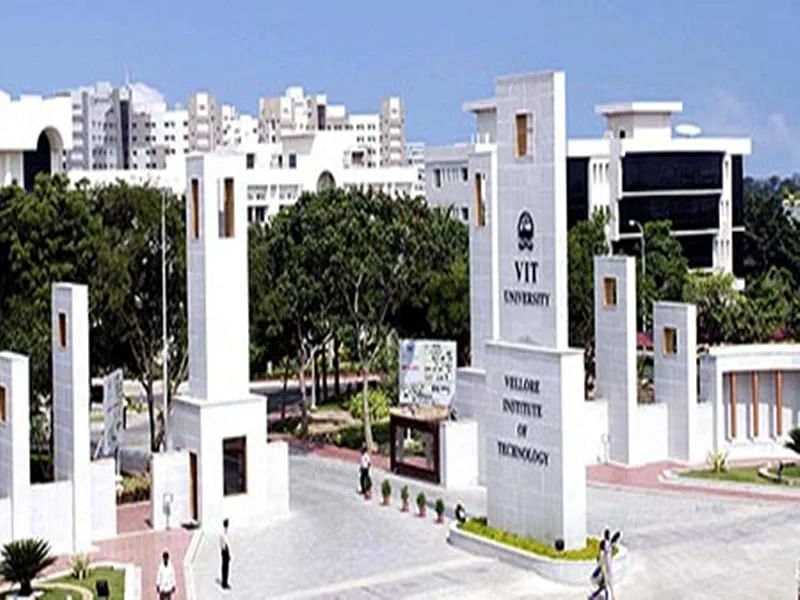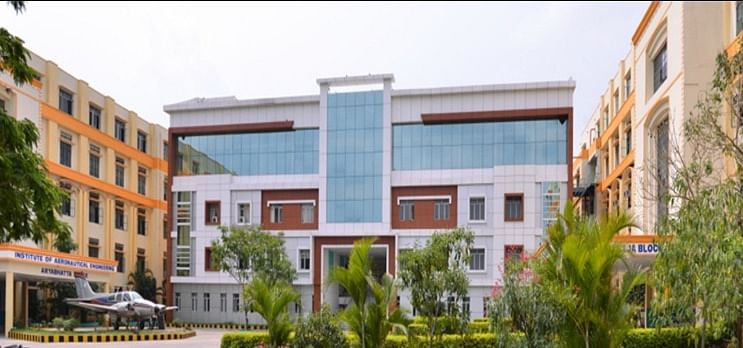B.Tech Cyber Security Syllabus and Subjects

The B.Tech Cyber Security syllabus is divided into eight semesters and focuses on important topics such as Programming, OOP, Information Security, Digital Forensics, Data Structure and more. The BTech Cyber Security course curriculum is spread across four years offering a combination of core subjects, elective offerings, practicals, internships, and projects.
The core B.Tech Cyber Security subjects deal with important topics such as Analysis and Design of Algorithms, Database Management Systems, Intrusion Detection Systems, etc. The elective subjects cover topics such as Cyber Crimes and Laws, Data Mining and Warehousing, Ethical Hacking, and more that enable students to specialise in their area of interest.
Table of Contents
B.Tech Cyber Security Syllabus Semester Wise
The BTech in Cyber Security syllabus focuses on providing students with a comprehensive understanding of cyber security principles, practices, and technologies. The B.Tech in Cyber Security syllabus followed across institutions is generally the same all over India with slight variations in certain subjects and elective offerings.
The semester-wise BTech Cyber Security syllabus followed commonly by most institutions in India is detailed in the sections below.
B.Tech Cyber Security Syllabus 1st Year
The B.Tech Cyber Security syllabus 1st year deals with fundamental engineering and science subjects such as Engineering Physics, Electronics and Electrical engineering, Data Structures using C, and more. Below listed is the BTech Cyber Security first year syllabus.
| Semester I | Semester II |
| Communicative English | Mathematics-II |
| Mathematics-I | Electronics Engineering |
| Engineering Physics | Engineering Physics-II |
| Electrical Engineering-I | Data Structure Using C |
| Programming Using C | Object Oriented Concepts and Python Programming |
| Environmental Science | Human Value & Soft Skills |
| Practical / Lab Work | Practical / Lab Work |
Practical Topics For B.Tech Cyber Security Syllabus 1st Year
The practical topics for BTech Cyber Security 1st year syllabus are listed below.
- Engineering Physics Lab
- Engineering Graphics
- Data Structure Using C Lab
- OOP and Python Lab
- Workshop Practices
B.Tech Cyber Security Syllabus 2nd Year
The B.Tech Cyber Security syllabus 2nd year focuses on topics such as Information Security, R Programming, Operating Systems, and more. The syllabus of B.Tech Cyber Security 2nd year is provided in the table below.
| Semester III | Semester IV |
| Digital Electronics | Computer Architecture and Organization |
| Information Security | Analysis and Design of Algorithms |
| Discrete Mathematics | AI Data Analytics using R |
| R Programming | Cryptography and Security |
| Operating Systems | Soft Computing |
| Practical / Lab Work | Practical / Lab Work |
Practical Topics for B.Tech Cyber Security Syllabus 2nd Year
The practical topics for B Tech Cyber Security second year are given below.
- Digital Electronics Lab
- R Programming Lab
- Operating Systems Lab
- Cryptography and Security Lab
- Analysis and Design of Algorithms Lab
- AI Data Analytics using R Lab
B.Tech Cyber Security Syllabus 3rd Year
The B.Tech Cyber Security 3rd year syllabus focuses on topics such as Computation Theory, Computer Networks, Intrusion Detection Systems, and more. Below listed are the B Tech Cyber Security syllabus 3rd year.
| Semester V | Semester VI |
| Database Management Systems | Computer Networks |
| Theory of Computation | Cyber for Data Science |
| Programming in JAVA | Intrusion Detection Systems |
| BlockChain Technology | Cyber Crimes and Laws / Database and Cloud Security / Malware Analysis and Reverse Engineering / Steganography & Digital Watermarking |
| Introduction to Physical and Systems Security / Software Security and Trusted Systems / Biometrics / Cyber Security Threats | Software Testing and Project Management / Data Mining and Warehousing / Social Network Analysis / Cryptocurrency with ethereum |
| Practical / Lab Work | Practical / Lab Work |
Practical Topics for B.Tech Cyber Security Syllabus 3rd Year
The B Tech Cyber Security syllabus 3rd year practical topics are given below.
- Database Management Systems Lab
- Programming in JAVA Lab
- BlockChain Technology Lab
- Computer Networks Lab
B.Tech Cyber Security Syllabus 4th Year
The Cyber Security B Tech syllabus for the fourth year focuses on topics such as Digital Forensics, Ethical Hacking, Text and Web Intelligence, etc. Listed below are the B.Tech Cyber Security 4th year syllabus.
| Semester VII | Semester VIII |
| Text and Web Intelligence | Organisational Behaviour |
| Digital Forensics | Quantum Cryptography / IoT Cloud Processing and Analytics / Data Privacy / Cloud Security |
| Ethical Hacking / Information Security Risk Assessment / Wireless and Mobile Security / Wireless Sensor Networks | Summer Internship |
| Project | Project |
| Practical / Lab Work | Practical / Lab Work |
Practical Topics for B.Tech Cyber Security Syllabus 4th Year
Listed below are the B.Tech Cyber Security practicals topics for the 4th year syllabus.
- Text and Web Intelligence Lab
- Digital Forensics Lab
B.Tech Cyber Security Subjects
The B Tech Cyber Security subjects aim to equip the students with necessary skills and knowledge to understand the fundamentals of cyber security, gain proficiency in securing computer networks and systems, and more.
The year wise BTech Cyber Security subjects and the topics covered under them are detailed in the sections below.
BTech Cyber Security Subjects First Year
The B.Tech Cyber Security subjects 1st year focus on foundational engineering and science topics such as Programming, Searching & Sorting Techniques, Web Designing, and more. Below listed are the BTech Cyber Security subjects 1st year and the topics covered under them.
| Subjects | Topics Covered | Subject Type |
| Communicative English | Remedial English, Vocabulary, Punctuation, Comprehension | Core |
| Mathematics-I | Differential Calculus, Integral Calculus, Ordinary Differential Equations, Vector Calculus | |
| Engineering Physics | Atomic Structure, Statistical Mechanics, Elemental & Compound Semiconductors, P-N Junctions, Optical Transitions | |
| Electrical Engineering-I | Basic Electrical Quantities, Network Analysis Techniques & Theorems, Alternating Current Circuits, Transformers | |
| Programming Using C | Introduction to Programming, Preprocessors, Loops, Arrays, Strings, Pointers | |
| Environmental Science | Natural Resources, Ecosystems, Biodiversity Conservation, Environmental Pollution, Social Issues and Environment | |
| Mathematics-II | Linear Algebra, Gauss Elimination Method, Infinite Series, Complex Analysis, Uniform Convergence, Statistics and Probability | |
| Electronics Engineering | Analog Electronics, PN Junction Diode, PNP and NPN Transistors, Digital Electronics, Communication Engineering | |
| Engineering Physics-II | Special Theory of Relativity, Wave Mechanics, Atomic Physics, Solid State Physics | |
| Data Structure Using C | Searching and Sorting Techniques, Linear Data Structures, Non Linear Data Structures, Linked Lists, Doubly Linked List, Trees | |
| Object Oriented Concepts and Python Programming | Data Types, Lists, Tuples, Dictionaries, Classes and OOP, Graphical User Interfaces | |
| Human Value & Soft Skills | Motivation and Objectives of Human Values Course, Concept of Preconditioning, Concept of Natural Acceptance in Human Being, Understanding Relationships | |
| Engineering Physics Lab | Forward & Reverse Characteristics of P-N Junction Diode, Solar Cell, Zener Diode, Resistance | Laboratory/Practical |
| Engineering Graphics | Web Designing, HTML, XHTML, CSS, Javascript, Google Web Designer | |
| Data Structure Using C Lab | Two-Dimensional Array, Linear Search, Binary Search Method, Quick Sort Technique | |
| OOP and Python Lab | Data Structures, Classes, Objects, Inheritance, PyQt, NumPy, SciPy, Matplotlib, IPython | |
| Workshop Practices | Manufacturing Processes, Machines, Fitting, Carpentry, Foundry, Welding |
B.Tech Cyber Security Subjects Second Year
The B.Tech Cyber Security subjects 2nd year deals with topics such as Digital Systems, Access Control, Data Visualization, Network Security, etc. The second year B Tech Cyber Security subjects are listed in the table below.
| Subjects | Topics Covered | Subject Type |
| Digital Electronics | Digital Systems, Logic Families, Combinational Digital Circuits, Sequential Circuits & Systems, A/D and D/A Converters | Core |
| Information Security | Integrity Models, Security Model Work, CIA Triad, Domains of Cyber Security, User Authentication, Access Control | |
| Discrete Mathematics | Set Theory, Relations, Functions, Logic And Propositional Calculus, Basic Counting Techniques, Recursion & Recurrence Relation, Algebraic Structures, Graphs Theory | |
| R Programming | Basics of R, Operators & Loops, Data Types in R, Data Visualization | |
| Operating Systems | Processes, Process Scheduling, Deadlocks, Memory Management, Virtual Memory, File Management, Disk Management | |
| Computer Architecture and Organization | Boolean Algebra, Logic Gates, Instruction Set Architecture, Memory Hierarchy, Parallelism & Interrupts | |
| Analysis and Design of Algorithms | Basic Concepts of Algorithms, Brute Force, Divide and Conquer Strategy, Greedy Approach and Dynamic Programming, Backtracking and Branch and Bound | |
| AI Data Analytics - R | Data Analysis, R Programming Basics, Data Visualization Using R, Statistics With R | |
| Cryptography and Security | Symmetric Key Ciphers, Asymmetric Key Ciphers, Hash Functions, Digital Signatures, Network Security | |
| Soft Computing | Fuzzy Logic, Machine Learning Basics, Neural Networks, Genetic Algorithms, GA in Machine Learning | |
| Digital Electronics Lab | Logic Gates, XOR Gates, Multiplexer, Flip Flops, Asynchronous and Synchronous Counter, Shift Register, DAC Operation, ADC Operation | Laboratory/Practical |
| R Programming Lab | Processing of Data, I/O Interface Programming, Data Visualization, Application Level Simulation using R | |
| Operating Systems Lab | UNIX, FCFS & SJF CPU Scheduling Algorithms, Round Robin & Priority CPU Scheduling, Page Replacement Algorithms | |
| Cryptography and Security Lab | Basic Security Attacks & Services, Symmetric & Asymmetric Key Algorithms for Cryptography, Authentication Functions, Encryption & Decryption Algorithms | |
| Analysis and Design of Algorithms Lab | Sorting Techniques, Tree Traversal Algorithms, Merge Sort and Quick Sort Algorithm, Dynamic Programming | |
| AI Data Analytics using R Lab | R as Calculator Application, Descriptive Statistics in R, Datasets, Visualizations, Regression Model |
B.Tech Cyber Security Subjects Third Year
The B.Tech Cyber Security subjects of the third year covers important topics such as OOPs, Distributed System, Security Threat Management, Blockchain Technology, and more. Below listed are the B.Tech Cyber Security subjects and the topics covered.
| Subjects | Topics Covered | Subject Type |
| Database Management Systems | Database System Architecture, Data Models, Relational Query Languages, Transaction Processing, Database Security | Core |
| Theory of Computation | Finite Automata, Regular Expression, Grammars, PushDown Automata, Turning Machines, Undecidability | |
| Programming in JAVA | OOPs Implementation, Inheritance & Runtime Polymorphism, Threads, Swing & AWT, Package & Scopes, Exception Handling, Collection Framework | |
| BlockChain Technology | Distributed System, Cryptography in Blockchain, Bitcoin, Ethereum | |
| Computer Networks | Data Link Layer, Medium Access Sublayer, Network Devices, Routing Algorithms, Transport Layer, Application Layer, Network Security | |
| Cyber for Data Science | Python and Data Types, NumPy, Pandas, Visualization Using MatPlotlib | |
| Intrusion Detection Systems | IDPS Technologies, Network-Based IDPS, Network Behaviour Analysis, Host Based IDPS, IDPS Technologies | |
| Introduction to Physical and Systems Security | Physical Security Threats, Software Security Issues, Operating System Security, Security System Planning, Human Resources Security | Elective |
| Software Security and Trusted Systems | Software Security Issues, Operating System Security, Bell-Lapula Model for Computer Security, Wireless and Mobile Security | |
| Biometrics | Physiological and Behavioural Modalities, Multimodal Biometric Systems, Biometrics Applications | |
| Cyber Security Threats | Security Threat Management, Threat Analysis, Authorization & Authentication, Security Requirements Specifications, Access Control | |
| Cyber Crimes and Laws | Definition & Terminology, IT Act 2000, Electronic Records, Regulatory Framework | |
| Database and Cloud Security | Database Principles, SQL Injection Attacks, Cloud Computing Reference Architecture, Data Protection in the Cloud | |
| Malware Analysis and Reverse Engineering | Static & Dynamic Analysis, File System Monitoring, Dynamic Analysis Tools, Malware Functionality, Anti-Reverse Engineering | |
| Steganography & Digital Watermarking | Information Hiding, Steganography, Watermarking, Models of Watermarking, Steganalysis, Steganographic Communication | |
| Software Testing and Project Management | Introduction, Testing Techniques, Dynamic Testing, Static Testing, SPM, Project Evaluation & Estimation, Risk Management | |
| Data Mining and Warehousing | Basic Statistics, Data Preprocessing, Data Mining, Data Warehousing, Data Wrangling, ETL | |
| Social Network Analysis | Social Network Mining, Graph Models, Node Metrics, Social-Network Graph Analysis, Information Diffusion in Social Networks | |
| Cryptocurrency With Ethereum | DLT, Bitcoin, Ethereum Virtual Machine, Cryptocurrency Regulation, Cryptocurrency Exchange, Black Market and Global Economy | |
| Database Management Systems Lab | SQL Queries, PL/SOL Block, Inventory Control System, Material Requirement Processing, Personal Information System | Laboratory/Practical |
| Programming in JAVA Lab | Stack and Queue Concept, Syntax and Logical Errors in Java code, I/O and GUI | |
| BlockChain Technology Lab | Basic Blocks Creation, Blockchain Development, Merkle Tree, Blockchain Systems, Crypto-currency Wallet | |
| Computer Networks Lab | Packet Tracer, RJ45 Cable, Network Topology, Routing Information Protocol, OSPF, Border Gateway Protocol, Application Layer Protocols |
B.Tech Cyber Security Subjects Fourth Year
The BTech Cyber Security subjects of the fourth year focus on advanced topics such as Data Preprocessing, Ethical Hacking, IT Security Management, Cloud Computing, Encryption Techniques, and more.
The fourth year cyber security subjects in BTech are provided in the table below.
| Subjects | Topics Covered | Subject Type |
| Text and Web Intelligence | Data Preprocessing, Text Mining & Analytics, Sentiment Analysis, Opinion Mining, Cascading & Diffusion in Networks | Core |
| Digital Forensics | Computer Forensics Fundamentals, Evidence Collection, Data Seizure, Computer Forensic Tools | |
| Organisational Behaviour | Group Dynamics, Leadership and Management, Organisational Structure & Design, HR Management | |
| Ethical Hacking | Hacking Impacts, Risk Analysis and Ethical Hacking, Business Perspective, Technical Preparation, Enumeration | Elective |
| Information Security Risk Assessment | IT Security Management, Risk Assessment, IT Security Controls, Physical and Infrastructure Security, Security Auditing | |
| Wireless and Mobile Security | Security Issues in Mobile Communication, Devic Security, Network Security, Server Levels Security, Application Level Security | |
| Wireless Sensor Networks | Architectures, Networking Sensors, Infrastructure Establishment, Sensor Tasking and Control | |
| Quantum Cryptography | Quantum Mechanics, QKD, Quantum Entanglement, Quantum-resistant Algorithms | |
| IoT Cloud Processing and Analytics | IoT Architecture, Sensor Network and Communication Protocols, Cloud-based IoT Platforms, Scalability and Reliability in Cloud-based IoT Applications | |
| Data Privacy | Data Classification & Identification, PETs, Encryption Techniques, Privacy Impact Assessments | |
| Cloud Security | Cloud Computing Models, IAM, Data Encryption & Tokenization, Container Security | |
| Text and Web Intelligence Lab | Web Mining Using NLTK, Retrieve and Mining Information, Stemming & Lemmatization Techniques, Clustering Methodologies | Laboratory/Practical |
| Digital Forensics Lab | Evidence Collection From Computers and Mobile, Network Forensics, Forensic Data Analysis |
BTech Cyber Security Course Structure
The B.Tech Cyber Security course structure is strategically designed to include theoretical and practical coursework. The course aims to transform engineering aspirants into qualified professionals capable of meeting the demands of the industry both technically and academically. The course structure is outlined below:
- VIII Semesters
- Core Subjects
- Elective Subjects
- Practicals
- Projects
- Internships
- Industrial Training
B.Tech Cyber Security Teaching Methodologies and Techniques
The B.Tech Cyber Security course curriculum employs various techniques and methods of teaching to provide students with an extensive understanding of the syllabus. Listed below are the teaching methodologies and techniques followed by institutions in India:
- Lectures
- Laboratory
- Group Discussions
- Case Studies
- Workshops
- Guest Lectures
- Industrial Visits
B.Tech Cyber Security Projects
The projects in the B.Tech curriculum enable students to apply their theoretical knowledge into practical applications. Below listed are some of the popular project topics for B.Tech Cyber Security students.
- Design and implement a messaging application with end-to-end encryption to ensure privacy and confidentiality.
- Analyse malware samples to understand their behaviour and develop detection techniques.
- Develop machine learning models to detect and classify network intrusions and anomalous behaviour in real-time.
- Design and implement a biometric authentication system to enhance user authentication security.
- Implement a blockchain-based authentication mechanism to enhance the security and integrity of user authentication processes.
B.Tech Cyber Security Books
The B.Tech Cyber Security books provide students with detailed explanations, latest information, and examples to help students understand the complex concepts and topics covered in the B.Tech Cyber Security syllabus. The B.Tech Cyber Security books for each year are provided in the sections below.
B.Tech Cyber Security Books 1st Year
The BTech Cyber Security books for the first year focuses on the fundamentals of engineering and science concepts such as basic science and engineering subjects, data structures using C, programming, etc. The first year B.Tech Cyber Security books are given in the table below.
| Books | Authors | Topics Covered |
| Semiconductor Optoelectronics: Physics and Technology | J. Singh | Semiconductor Fundamentals, Semiconductor Fabrication Techniques, Materials & Structures, Optical Properties |
| Advanced Engineering Mathematics | Erwin Kreyszig | Complex Analysis, Vector Calculus, Differential Equations, Fourier Analysis |
| Data Structures with C | Seymour Lipschutz | Arrays, Strings, Stacks & Queues, Linked Lists, Trees, Hashing Techniques |
| Programming Python: Powerful Object-Oriented Programming | Mark Lutz | Python Basics, OOP, File Handling, Exception Handling, Database Connectivity |
B.Tech Cyber Security Books 2nd Year
The BTech Cyber Security books for the second year deals with topics such as information security, computer architecture, AI Data Analytics, etc. Listed below are the B.Tech Cyber Security 2nd year books.
| Books | Authors | Topics Covered |
| Essentials of R for Data Analytics | Saroj Dahiya Ratnoo and Himmat Singh Ratnoo | Data Manipulation & Visualization, Statistical Analysis and Modelling, Machine Learning Algorithms |
| Data Mining Concepts and Techniques | Jiawei Han, Micheline Kamber, and Jian Pei | Data Preprocessing, Classification & Prediction Technique, Cluster Analysis, Web Mining |
| Algorithm Design | Jon Kelinberg and Eva Tardos | Greedy Algorithms, Dynamic Programming, Network Flow Algorithms |
| Cryptography & Network Security | Atul Kahate | Classical Encryption Techniques, Symmetric Key Encryption, Public Key Cryptography, Network Security Protocols |
B.Tech Cyber Security Books 3rd Year
The BTech Cyber Security books for the third year focus on topics such as computer network, intrusion detection system, database management systems, and more. Below listed are the B.Tech Cyber Security third year books.
| Books | Authors | Topics Covered |
| Database System Concepts | Abraham Silberschatz, Henry F. Korth, and S. Sudarshan | Databases, Relational Data Model, SQL and Database Design, Database Normalization |
| Introduction to the Theory of Computation | Michael Sipser | Finite Automata & Regular Languages, Turing Machines, and Decidability, Computability Theory, Cryptography |
| Data Communication and Networking | Behrouz A. Forouzan | Transmission Media, Data Encoding and Modulation, OSI and TCP/IP Models |
| Introduction to Python using Computer Science | Charles Dierbach | Python Basics and Syntax, Control Structures, Data Structures, File Handling |
B.Tech Cyber Security Books 4th Year
The fourth year B Tech Cyber Security books cover topics such as web intelligence, digital forensics, ethical hacking, and more. Listed below are the BTech Cyber Security books for the fourth year.
| Books | Authors | Topics Covered |
| Introduction to Information Retrieval | Christopher D. Manning, Prabhakar Raghavan and Hinrich Schütze | Information Retrieval Basics, Text Processing Techniques, Indexing, Searching Algorithms |
| Computer Forensics | John R, Vacca | Digital Evidence Collection & Preservation, Forensic Imaging, File System Forensics, Network Forensics |
| Applied Text Analysis with Python | Tony Ojeda, Rebecca Bilbro, Benjamin Bengfort | NLP, Sentiment Analysis, NER, Topic Modeling, Text Summarization |
| Computer Evidence Collection & Presentation | Christopher L.T. Brown | Acquisition of Digital Evidence, Custody Procedures, Expert Witness Testimony, |
Top B.Tech Cyber Security Colleges
Top Engineering Entrance Exams
B.Tech Cyber Security Fee Structure
FAQs
What are the B.Tech Cyber Security core subjects?
The core B.Tech Cyber Security topics include Programming in C, Data Structures, Operating Systems, Cryptography and Security, and more.
What is the toughest subject in the syllabus of B.Tech Cyber Security?
The toughest subjects in BTech Cyber Security varies from student to student based on their interest. However, subjects like Cryptography and Security, Analysis and Design of Algorithms, and Network Security are often considered challenging due to their complex and theoretical concepts.
Is there coding in BTech Cyber Security syllabus?
Yes, students will require an extensive knowledge of coding skills for B.Tech in Cyber Security.
What are the elective subjects in B.Tech Cyber Security?
The elective B.Tech Cyber Security subjects include Introduction to Physical and Systems Security, Software Security & Trusted Systems, Biometrics, Cyber Security Threats, Database and Cloud Security, Data Mining and Warehousing, and more.
What software tools are commonly used in B.Tech Cyber Security?
Commonly used software tools in B.Tech Cyber Security include programming languages such as Python, R, and Java, cybersecurity tools such as Wireshark, Metasploit for penetration testing, Snort for intrusion detection, and more.
How are the students evaluated in the B.Tech Cyber Security course?
The B.Tech Cyber Security are evaluated based on their performance in the written exams, practical assessments, projects, presentations, internships, and viva voce.
Where to find the BTech Cyber Security syllabus PDF?
The B.Tech Cyber Security syllabus PDF is usually provided by the respective institutions offering the program. Students can access the syllabus PDF and subject list from the college website, academic handbooks, or by contacting the institutions directly.






















